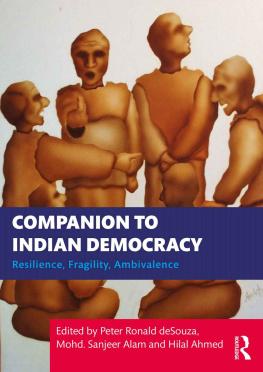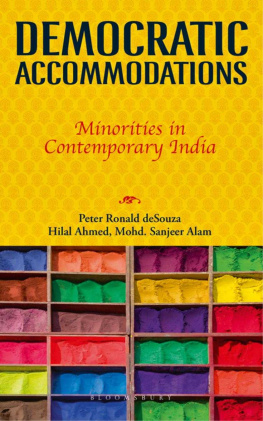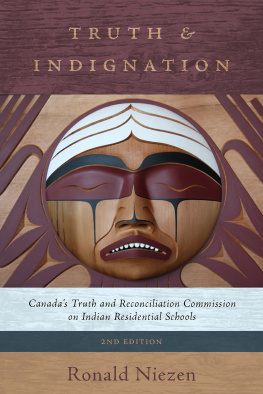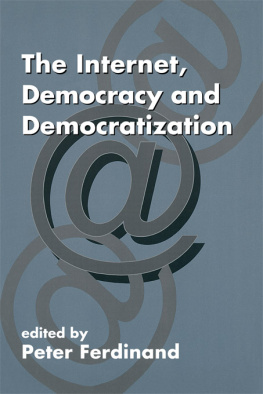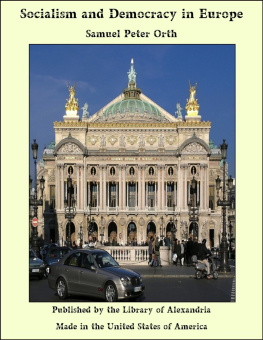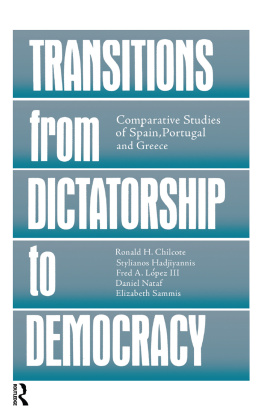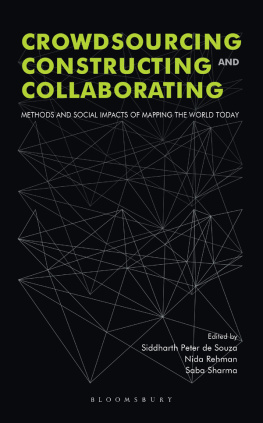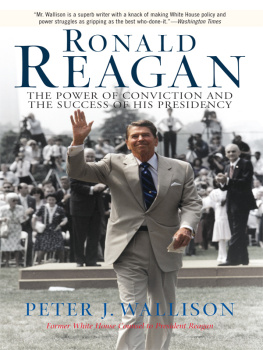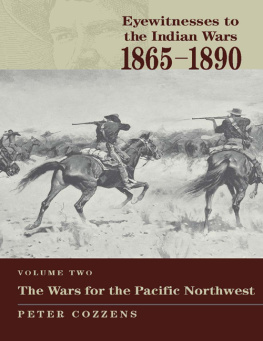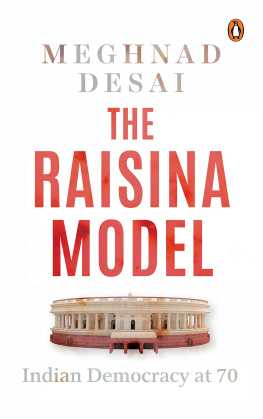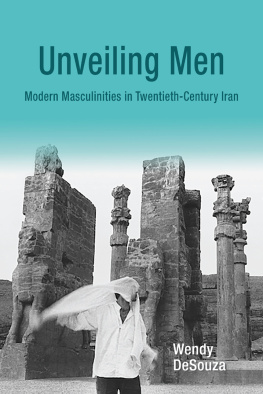Peter Ronald deSouza - Companion to Indian Democracy
Here you can read online Peter Ronald deSouza - Companion to Indian Democracy full text of the book (entire story) in english for free. Download pdf and epub, get meaning, cover and reviews about this ebook. year: 2021, publisher: Taylor and Francis, genre: Politics. Description of the work, (preface) as well as reviews are available. Best literature library LitArk.com created for fans of good reading and offers a wide selection of genres:
Romance novel
Science fiction
Adventure
Detective
Science
History
Home and family
Prose
Art
Politics
Computer
Non-fiction
Religion
Business
Children
Humor
Choose a favorite category and find really read worthwhile books. Enjoy immersion in the world of imagination, feel the emotions of the characters or learn something new for yourself, make an fascinating discovery.
- Book:Companion to Indian Democracy
- Author:
- Publisher:Taylor and Francis
- Genre:
- Year:2021
- Rating:3 / 5
- Favourites:Add to favourites
- Your mark:
- 60
- 1
- 2
- 3
- 4
- 5
Companion to Indian Democracy: summary, description and annotation
We offer to read an annotation, description, summary or preface (depends on what the author of the book "Companion to Indian Democracy" wrote himself). If you haven't found the necessary information about the book — write in the comments, we will try to find it.
Companion to Indian Democracy — read online for free the complete book (whole text) full work
Below is the text of the book, divided by pages. System saving the place of the last page read, allows you to conveniently read the book "Companion to Indian Democracy" online for free, without having to search again every time where you left off. Put a bookmark, and you can go to the page where you finished reading at any time.
Font size:
Interval:
Bookmark:
This book presents a comprehensive overview of the contemporary experiences of democracy in India. It explores the modes by which democracy as an idea, and as a practice, is interpreted, enforced, and lived in Indias current political climate.
The book employs case studies as a methodological vantage point to evolve an innovative conceptual framework for the study of democracy in India. The chapters unpack a diverse range of themes such as democracy and Dalits; agriculture, new sociality and communal violence in rural areas; changing nature of political communication in India; role of anti-nuclear movements in democracies; issues of subaltern citizens voice, impaired governance and the development paradigm; free speech and segregation in the public sphere; and, the surveillance state and Indian democracy. These thematic explorations are arranged in an engaging sequence to offer a multifaceted narrative of Indian democracy especially in relation to the recent debates on citizenship and constitutionalism.
A key critical intervention on contemporary politics in South Asia, this book will be essential reading for scholars and researchers of political studies, political science, political sociology, comparative government and politics, sociology, social anthropology, public administration, public policy, and South Asia studies. It will also be of immense interest to policymakers, journalists, think tanks, bureaucrats, and organizations working in the area.
Peter Ronald deSouza, formerly Professor at the Centre for the Study of Developing Societies, is D.D. Kosambi Visiting Professor in Interdisciplinary Studies at Goa University, India.
Mohd. Sanjeer Alam is Associate Professor at the Centre for the Study of Developing Societies, New Delhi, India.
Hilal Ahmed is Associate Professor at the Centre for the Study of Developing Societies, New Delhi, India.
Resilience, Fragility, Ambivalence
Edited by Peter Ronald deSouza Mohd. Sanjeer Alam and Hilal Ahmed

First published 2022
by Routledge
2 Park Square, Milton Park, Abingdon, Oxon OX14 4RN
and by Routledge
605 Third Avenue, New York, NY 10158
Routledge is an imprint of the Taylor & Francis Group, an informa business
2022 selection and editorial matter, Peter Ronald deSouza, Mohd. Sanjeer Alam and Hilal Ahmed; individual chapters, the contributors
The right of Peter Ronald deSouza, Mohd. Sanjeer Alam and Hilal Ahmed to be identified as the authors of the editorial material, and of the authors for their individual chapters, has been asserted in accordance with sections 77 and 78 of the Copyright, Designs and Patents Act 1988.
All rights reserved. No part of this book may be reprinted or reproduced or utilised in any form or by any electronic, mechanical, or other means, now known or hereafter invented, including photocopying and recording, or in any information storage or retrieval system, without permission in writing from the publishers.
Trademark notice: Product or corporate names may be trademarks or registered trademarks, and are used only for identification and explanation without intent to infringe.
British Library Cataloguing-in-Publication Data
A catalogue record for this book is available from the British Library
Library of Congress Cataloging-in-Publication Data
A catalog record has been requested for this book
ISBN: 978-0-367-74935-4 (hbk)
ISBN: 978-1-032-11348-7 (pbk)
ISBN: 978-1-003-21947-7 (ebk)
DOI: 10.4324/9781003219477
Typeset in Bembo
by codeMantra
To Rajni Kothari, founder CSDS
Peter Ronald deSouza, Mohd. Sanjeer Alam, Hilal Ahmed
Peter Ronald deSouza, Mohd. Sanjeer Alam and Hilal Ahmed
Jatinder Singh
Satendra Kumar
Radhika Kumar
Deepa Mariam Varughese
Sthitapragyan Ray and Neha Ojha
G. Palanithurai
Gaurav J. Pathania
Pradeep Nayak
Gitika De
Satyajeet Nanda
Ayangbam Shyamkishor
Shilp Shikha Singh
Thahir Jamal Kiliyamannil
Nithin Jacob Thomas
Sukumar Muralidharan
Kalpana Dixit
P. Arun
Hilal Ahmed
- Peter Ronald deSouza was Director of the Indian Institute of Advanced Study (IIAS), Shimla, where he served two terms from 2007 till 2013. He was Professor at Goa University till 2003 and at the Centre for the Study of Developing Societies (CSDS) (20032020), and is currently DD Kosambi Visiting Professor at Goa University. His current research interests include (a) exploring conundrums in democracy particularly Indian democracy through the recognition of ambivalence and the acknowledgement of inconvenient facts; (b) examining the colonization of the mind, by the knowledge and governmental practices of the West seen both in its colonial history and its after life; and (c) studying the impact of science on society which began with an interest in the scientific temper movement in India, but has grown to engage with the larger set of issues of science, technology, society and ethics.
- His recent publications are: In the Hall of Mirrors: Reflections on Indian Democracy by Orient Blackswan, New Delhi, (2018); Democratic Accommodations: Minorities in Contemporary India (with Hilal Ahmed and Sanjeer Alam), Bloomsbury, New Delhi, August 2019. He has edited (with Rukmini Bhaya Nair) Keywords for India, Bloomsbury, London, February 2020; At Home with Democracy: A Political Theory of India, Essays of D.L. Sheth, where he wrote the Introduction, Palgrave Macmillan, New Delhi, 2017.
- Mohd. Sanjeer Alam, a social geographer by training, is Associate Professor at the Centre for the Study of Developing Societies (CSDS), India. He studied in Jawaharlal Nehru University where he received his Ph.D. His research interests encompass a variety of themes, including democratic politics, democratization of education and sociospatial inequalities, and social exclusion and affirmative action. He has published extensively on these themes in edited volumes and both national and international journals. His major work is a book titled: Religion, Community, and Education: The Case of Rural Bihar (2012). He has co-edited with K. C. Sivaramakrishnan the volume: Fixing Electoral Boundaries in India: Processes, Outcomes and Implications for Political Representation (2015). Recently, he has co-authored the book Democratic Accommodation: Minorities in Contemporary India (Peter Ronald deSouza and Hilal Ahmed, 2019).
- Hilal Ahmed is Associate Professor, the Centre for the Study of Developing Societies (CSDS), India, and Fellow, Institute of Advanced Studies, Nantes, France. He works on political Islam, Muslim politics of representation, and politics of symbols in South Asia. His first book Muslim Political Discourse in Postcolonial India: Monuments, Memory, Contestation (2014) explores these thematic concerns to evolve an interdisciplinary approach to study Muslim politics. His recent works, Siyasi Muslims: A story of Political Islam in India (2019) and Democratic Accommodations: Minorities in Contemporary India (With Peter Ronald deSouza and Mohd. Sanjeer Alam, 2019), further elaborate these themes and make a modest attempt to explain the discursively constituted nature of contemporary Muslim political discourse in India. Ahmed is also currently working on a book project on the politics of Muslim political representation in postcolonial India. He is also editing a Hindi Reader of Sudipta Kavirajs writings. Ahmed is the Associate Editor, South Asian Studies, journal of the British Association of South Asian Studies.
Font size:
Interval:
Bookmark:
Similar books «Companion to Indian Democracy»
Look at similar books to Companion to Indian Democracy. We have selected literature similar in name and meaning in the hope of providing readers with more options to find new, interesting, not yet read works.
Discussion, reviews of the book Companion to Indian Democracy and just readers' own opinions. Leave your comments, write what you think about the work, its meaning or the main characters. Specify what exactly you liked and what you didn't like, and why you think so.

